The Daily Bulletin is published by Internal and Leadership Communications, part of University Communications
Contact us at bulletin@uwaterloo.ca
Submission guidelines
Editor:
Brandon Sweet
University Communications
bulletin@uwaterloo.ca
"I am pleased to announce the appointment of Professor Susan Tighe as Deputy Provost, Integrated Planning and Budgeting and Professor Diana Parry as Associate Vice-President, Human Rights, Equity and Inclusion, for two-year terms commencing 1 July 2017," wrote Vice-President, Academic & Provost Ian Orchard in a memo circulated to campus on Tuesday.
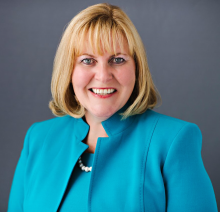 Susan Tighe completed her BSc in Chemical Engineering (Queens University, Kingston), continuing to further add an M.A.Sc. and PhD in Civil Engineering (University of Waterloo). She has been a faculty member in Civil and Environmental Engineering at the University of Waterloo since 2000 and is the Norman McLeod Chair in Sustainable Pavement Engineering. She is also currently the President of the Canadian Society for Civil Engineering. Susan has gained national and international recognition for her outstanding contributions to the development, design, and management of sustainable concrete and asphalt transportation infrastructure. Her reputation as a scholar, educator, and professional engineer is well illustrated by the breadth of her honours and awards including Canada’s Top 40 Under 40, New College of Scholars Royal Society of Canada and the Ontario Society of Professional Engineers Medal for Research and Development. This month, she will receive the 2017 University of Waterloo Graduate Supervision Award.
Susan Tighe completed her BSc in Chemical Engineering (Queens University, Kingston), continuing to further add an M.A.Sc. and PhD in Civil Engineering (University of Waterloo). She has been a faculty member in Civil and Environmental Engineering at the University of Waterloo since 2000 and is the Norman McLeod Chair in Sustainable Pavement Engineering. She is also currently the President of the Canadian Society for Civil Engineering. Susan has gained national and international recognition for her outstanding contributions to the development, design, and management of sustainable concrete and asphalt transportation infrastructure. Her reputation as a scholar, educator, and professional engineer is well illustrated by the breadth of her honours and awards including Canada’s Top 40 Under 40, New College of Scholars Royal Society of Canada and the Ontario Society of Professional Engineers Medal for Research and Development. This month, she will receive the 2017 University of Waterloo Graduate Supervision Award.
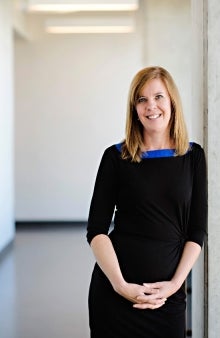 Diana Parry has a Bachelor of Recreation and Leisure Studies (Brock University), Master of Arts (University of Waterloo) and a PhD in Leisure Studies (University of Illinois at Urbana-Champaign). Diana is a Professor in Applied Health Sciences and has been at the University of Waterloo since 2003. Utilizing a feminist lens, Diana's research privileges women's standpoints and aims to create social change and enact social justice by challenging the medical model of scholarship. In particular, Diana’s research explores the personal and political links between women's leisure and women's health, broadly defined.
Diana Parry has a Bachelor of Recreation and Leisure Studies (Brock University), Master of Arts (University of Waterloo) and a PhD in Leisure Studies (University of Illinois at Urbana-Champaign). Diana is a Professor in Applied Health Sciences and has been at the University of Waterloo since 2003. Utilizing a feminist lens, Diana's research privileges women's standpoints and aims to create social change and enact social justice by challenging the medical model of scholarship. In particular, Diana’s research explores the personal and political links between women's leisure and women's health, broadly defined.
In 2013 Diana was appointed as Special Advisor to the President on Women’s and Gender Issues. In this role, Diana liaised with senior administration, faculty, and the Director of Equity to advise on policy and structural level gender equity issues, and to help foster a supportive environment for students, staff and faculty. Diana is the campus lead for the UN Women’s HeForShe/IMPACT 10x10x10 campaign, which is a global solidarity movement that unites people around the world in advancing gender equity.
"I am grateful to Susan and Diana for taking on these important leadership roles at the University of Waterloo," writes the provost. "Please join Feridun and I in welcoming Susan and Diana to the Senior Leadership Team."
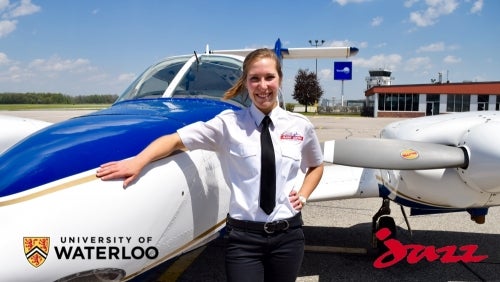
Penning a new 5-year deal to help aviation grads launch their flying careers, the University of Waterloo is proud to join the industry-leading Jazz Aviation Pathways Program (Jazz APP).
“I assumed for my career that I would have to start small,” Aviation student Jenna Yee said. Like many young pilots, she imagined she would have to move North to get her flying career off the ground. “But this opportunity really opens a whole new pathway into the industry.”
Jazz APP provides a direct career pathway for qualifying aviation students in their final year of study, offering flight simulator evaluations, student scholarships, and the opportunity for top-performing grads to transition to First Officer positions with Jazz or its affiliates.
“Members of this year’s graduating class are looking forward to the opportunity to be considered for direct entry into a major airline," said Ian McKenzie, Director of Aviation at Waterloo. “Our graduates currently fly globally to every continent, even Antarctica. The Jazz APP offers a 4 to 5-year jump start to their aviation career.”
Read the full story on the Aviation program's website.
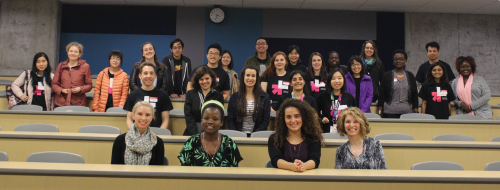
Speakers at the Menstrual Hygiene Day event pose with some event participants.
By Sabrina Li
About 800 million girls and women around the world undergo menstruation. Despite menstruation being a natural biological process, it is a private and taboo topic in many countries around the world.
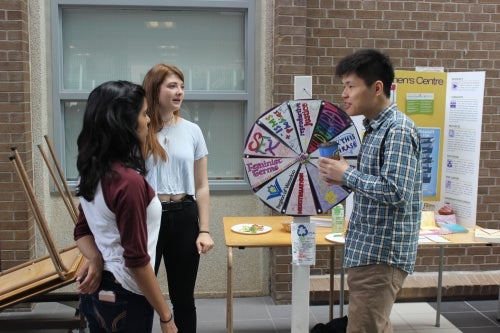 To break the conversation barrier associated with menstruation, a global advocacy event called Menstrual Hygiene Day was celebrated on Friday May 26 at the Science Teaching Complex. This event was primarily organized by two University of Waterloo graduate students with the help of a team of volunteers. Several faculties involved in the HeForShe IMPACT initiative for gender equality supported this event. Given that the theme of Menstrual Hygiene Day 2017 was “Education”, the aim of the event was to empower and draw attention to the extent of the period stigma, and lack of menstrual hygiene around the world. Activities planned for the day included a student fair in the morning and a panel discussion in afternoon.
To break the conversation barrier associated with menstruation, a global advocacy event called Menstrual Hygiene Day was celebrated on Friday May 26 at the Science Teaching Complex. This event was primarily organized by two University of Waterloo graduate students with the help of a team of volunteers. Several faculties involved in the HeForShe IMPACT initiative for gender equality supported this event. Given that the theme of Menstrual Hygiene Day 2017 was “Education”, the aim of the event was to empower and draw attention to the extent of the period stigma, and lack of menstrual hygiene around the world. Activities planned for the day included a student fair in the morning and a panel discussion in afternoon.
The student fair promoted education and awareness of the period stigma in a fun and interactive environment. Several activities were hosted concurrently at the student fair, including an interactive computer game called “The Tampon Run”, a colouring booth that promoted expression and empowerment, and an informative discussion on the benefits of reusable menstrual products. The Glow Centre for Sexual and Gender Diversity, Women’s Centre, and the Canadian Coalition of Global Health Research Student Chapter were also in attendance with interactive games and information on their resources and how students can get involved.
In the afternoon, a panel discussion was held featuring Dr. Susan Elliott (Professor) and Elizabeth Onyango (PhD Candidate and Queen Elizabeth Scholar) from the Department Geography and Environmental Management, Sabrina Rubli, co-Founder and Executive Director of NGO Femme International, and Amanda Jenkins, PhD Candidate in Social Psychology at the University of Guelph.
These panelists spoke on the historical perception of menstruation, the evolving perception of menstruation as a taboo subject, the development of menstrual products over time, lack of menstrual hygiene and consequences for girls in East Africa, and the best contributors to improving menstrual hygiene in the developing world, such as water and sanitation.
When asked, “what do you think men can do to help improve hygiene and reduce the stigma of menstruation?” all panelists agreed that education was key. It is important to include non-menstruators in the discussion.
Access to menstrual hygiene products is still a barrier for menstruators from low-income households. “You’ll find free condoms everywhere but rarely do you see free tampons or pads,” said co-Founder of Femme International, Sabrina Rubli. One of the ways for non-menstruators to offer support is to pack sanitary napkins or tampons in their bags for the people in their lives that might need them. Participants were provided with “I’m packing” buttons at the event. With them, they can self-identify as carriers of sanitary napkins and tampons and assist those that may not have access to menstrual hygiene products.
Résumé Tips: Thinking Like an Employer, Thursday, June 8, 1:30 p.m., TC - William M. Tatham Centre room 1208.
Problem Pitch Competition, Thursday, June 8, 7:00 p.m., Quantum-Nano Centre Room 0101.
International Archives Day, Friday, June 9, 9:00 a.m. to 3:00 p.m., Doris Lewis Rare Book Room, Dana Porter Library.
PhD seminar, “Adding mutation to dependent object types,” Marianna Rapoport, PhD candidate, David R. Cheriton School of Computer Science, Friday, June 9, 11:00 a.m. to 12:00 p.m., DC 3126.
Information Systems and Science for Energy seminar, “Managing sensor data streams: Lessons learned from the WeBike Project,” Christian Gorenflo, David R. Cheriton School of Computer Science, Friday, June 9, 1:00 p.m. to 2:00 p.m., DC 1331.
Earth Sciences Museum 50th Celebration Family Day, Saturday, June 10, 11:00 a.m. to 3:00 p.m., Earth Science Museum, CEIT.
Velocity Fund $5K applications close, Monday, June 12.
Hand-on Workshop with ADF Modeling Suite for Chemistry & Materials Science, Monday, June 12, 1:00 p.m. to 5:30 p.m., MC 3005.
Interviews: Preparing for Questions, Monday, June 12, 1:30 p.m., TC - William M. Tatham Centre room 1208
60th Anniversary Convocation Lecture featuring Roberta Jamieson, Monday, June 12, 7:00 p.m., Federation Hall.
Spring Convocation, Tuesday, June 13 to Saturday, June 17.
University Club Spring Convocation Luncheons, Tuesday, June 13 to Saturday, June 17, 11:30 a.m. to 2:00 p.m., University Club.
Distinguished Lecture Series, “Algorand, a new public ledger,” Silvio Micali, MIT Computer Science and Artificial Intelligence Laboratory, Tuesday, June 13, 10:30 a.m. to 12:00 p.m., DC 1302.
Group Bike Ride & Picnic in the Park, Tuesday, June 13, 12:00 p.m. to 1:00 p.m., Bikeshare station at Dana Porter Library main entrance.
Get a Job using LinkedIn, Tuesday, June 13, 5:00 p.m., Dana Porter Library room 329
Banting postdoctoral fellowship preliminary applications due, Wednesday, June 14.
Interviews: Proving your Skills, Wednesday, June 14, 2:30 p.m., TC - William M. Tatham Centre room 1208
Biology presents a public lecture by Stephen Scherer, "Decoding 10,000 Whole Genome Sequences Towards Understanding Autism," Wednesday, June 14, 3:00 p.m., STC 0060.
Velocity Start: Do People Want Your Sh*t? Wednesday, June 14, 7:30 p.m., Velocity Start, SCH 2ndFloor.
Working Effectively in another Culture, Thursday, June 15, 1:30 p.m., TC - William M. Tatham Centre room 1208
Recognizing Excellence Discussion Series featuring Professor Efim Zelmanov, University of California, "Asymptotic Theory of Finite Groups," Thursday, June 15, 2:00 p.m., DC 1302. Register today.
50th Anniversary Celebration of the School of Architecture, Thursday, June 15, 6:00 p.m., School of Architecture.
Recognizing Excellence Discussion Series featuring Vicki Iverson, "My Journey from Student to Entrepreneur," Thursday, June 15, 3:15 p.m., DC 1302. Register today.
How to be an Exceptional Employee, Friday, June 16, 12:30 p.m., TC - William M. Tatham Centre room 1208
Cryptography, Security, and Privacy Colloquium, “Average-case fine-grained hardness, and what to do with it,” Prashant Nalini Vasudevan, PhD candidate, MIT, Friday, June 16, 2:00 p.m. to 3:00 p.m., DC 2585.
NEW - WaterTalk: Linking Eawag’s Research to Policy and Practice presented by Janet Hering, director of the Swiss Federal Institute of Aquatic Science & Technology (Eawag), Monday, June 19, 2:30 p.m. to 3:30 p.m., QNC 1501.
Senate meeting, Monday, June 19, 3:30 p.m., NH 3407.
Electrical and Computer Engineering Distinguished Lecture featuring Professor Göran Andersson, "Research Challenges of the Future Electric Power System," Monday, June 19, 2:00 p.m., EIT 3142.
PhD seminar, A biologically constrained model of semantic memory search,” Ivana Kajić, PhD candidate, David R. Cheriton School of Computer Science, Tuesday, June 20, 11:00 a.m.to 12:00 p.m., DC 2310.
25, 35, and 45-Year Club Recognition Reception, Tuesday, June 20, 6:00 p.m., Physical Activities Complex.
Bike Day, Wednesday, June 21, 8:00 a.m. to 3:00 p.m., Arts Quad.
Community Dialogue event, “Uncomfortable is OK: How Truth and Reconciliation Shapes Us All,” Wednesday, June 21, 6:00 p.m., University of Waterloo Stratford Campus.
Velocity Start: How to Find Your Customers Online, “Using online platforms to find potential customers,” Wednesday, June 21, 7:30 p.m., Velocity Start, SCH 2ndFloor.
Velocity Fund $25K applications close, Saturday, June 24.
Network for Aging Research Spring 2017 Symposium, “Engagement in Innovation,” Monday, June 26, 8:00 a.m. to 1:15 p.m.
Algorithms and complexity seminar, “Settling the query complexity of non-adaptive junta testing,” Erik Waingarten, Columbia University, Wednesday, June 28, 1:30 p.m. to 2:30 p.m., DC 1304.
Velocity Start: Pitch Like A Pro, “Perfecting your pitch,” Wednesday, June 28, 7:30 p.m., Velocity Start, SCH 2nd Floor.
The Daily Bulletin is published by Internal and Leadership Communications, part of University Communications
Contact us at bulletin@uwaterloo.ca
Submission guidelines
The University of Waterloo acknowledges that much of our work takes place on the traditional territory of the Neutral, Anishinaabeg, and Haudenosaunee peoples. Our main campus is situated on the Haldimand Tract, the land granted to the Six Nations that includes six miles on each side of the Grand River. Our active work toward reconciliation takes place across our campuses through research, learning, teaching, and community building, and is co-ordinated within the Office of Indigenous Relations.